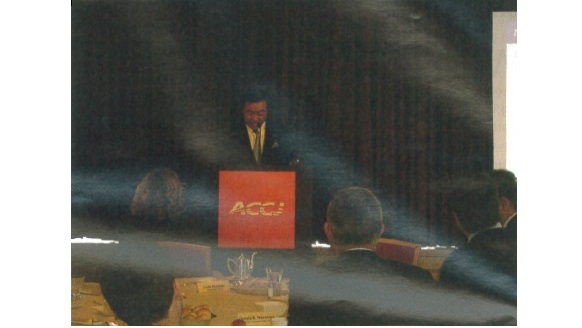Suzy Small reveals Governor Matsuzawa’s thinking towards a dynamic and modern Japan
KANAGAWA GOVERNOR Shigefumi Matsuzawa is well qualified to speak on the issue of the division of power between Japan’s regional and centralized governments, having served as first a prefectural assembly member for Kanagawa, then a member of the House of Representatives for three terms, before returning to local government and being inaugurated as governor of Kanagawa Prefecture in April 2003. Matsuzawa became interested in politics early, majoring in political science and law at Keio University and then, after graduation, studying at the Matsushita Institute of Government and Management. During his time at Matsushita, he worked in the U.S. as a staff member for a Lower House representative and for the attorney general of the State of Maryland. As a result of his time in the U.S. he returned to Japan with “a dream to create voter oriented democratic politics in Japan, as in America,” he says.
After graduating from Matsushita in 1987, Matsuzawa was elected to the Kanagawa Prefectural Assembly as an independent candidate. Aged 29, he was the youngest representative ever elected to the Assembly. During his six years in regional government he became disillusioned with the way that central government operated in Japan.
In contrast to his infamous 2003 comment
during a campaign speech that “Foreigners are
all sneaky thieves,” Matsuzawa is now actively
encouraging foreign investment in Kanagawa
with a ranqe of incentives
“At that time, almost every candidate who ran for government promised political reform. However, once they were elected to the Diet, they would make excuses about why it was too difficult to change.” Frustrated, he decided to run for the Diet himself, and was elected in 1993. During his nine years in office he was active in campaigning for changes, including the privatization of the postal service and public corporations, but he found the Kasumigaseki government was so strongly resistant to change, that all reform was ultimately compromised.
However, during his time in the Diet, Matsuzawa had become aware of a new breed of regional politician, who were free from the interference of political parties and corporations, allowing them to make bold changes. “I came to feel that if I want to change this country now, maybe local government is the place I can do it.” He ran for Prefectural Governor of Kanagawa and won. He hopes that through regional government he can affect the change that he saw stall in the Diet, “By changing Kanagawa, I can change Japan.”
Matsuzawa believes strongly that there is a need to change the system of excessive centralization that has existed in Japan since the Meiji era, to which the country’s economic decline in recent years has in part been attributed. He says it is necessary to develop dynamic, democratic local government to counterbalance the power of Kasumigaseki, and is emphatically in favor of the so-called “Trinity Reforms” which propose the end of subsidies to local government, to be replaced instead with a transfer of tax revenue. This reform package was first proposed in 2002, but there has been considerable delay in implementing it, due to Government unwillingness to abolish the subsidies, which act as powerful tools of control. Matsuzawa ultimately hopes for a Japan where the Kasumigaseki government is responsible for defense, currency and international relations, but all other areas are decided by individual prefectures.
As well as campaigning for greater autonomy, Matsuzawa is busily promoting Kanagawa as a base for businesses in Japan. He sees it as an area with much to offer, being rich in natural resources and skilled people, and already host to many major corporations. In contrast to his infamous 2003 comment during a campaign speech that “Foreigners are all sneaky thieves. As Tokyo Gov. (Shintaro) Ishihara has cracked down on them, they have flowed into Kanagawa Prefecture,” Matsuzawa is now actively encouraging foreign investment in Kanagawa with a range of incentives, including subsidies and a “one stop shop” service designed to help overseas businesses become established, as well as local ones. As a result of the campaign several major companies, including Fuji, Ricoh, Nissan and Sony, are planning to invest ¥350 million in Kanagawa.
Although Matsuzawa is at times controversial, and there are many who disagree with his policy of extreme devolution, it is encouraging to see strong leaders affecting change in regional government, and will be interesting to see if this does, as he promises, change the rest of Japan.
This article is based on a presentation given by Governor Matsuzawa on Mar. 7, organized by The American Chamber of Commerce in Japan. For information on ACCJ membership and upcoming events, see www.accj.or.jp









